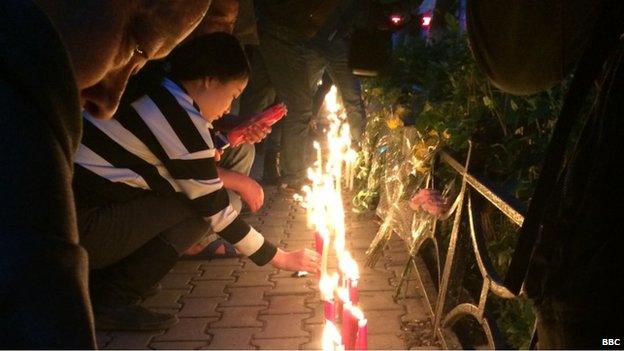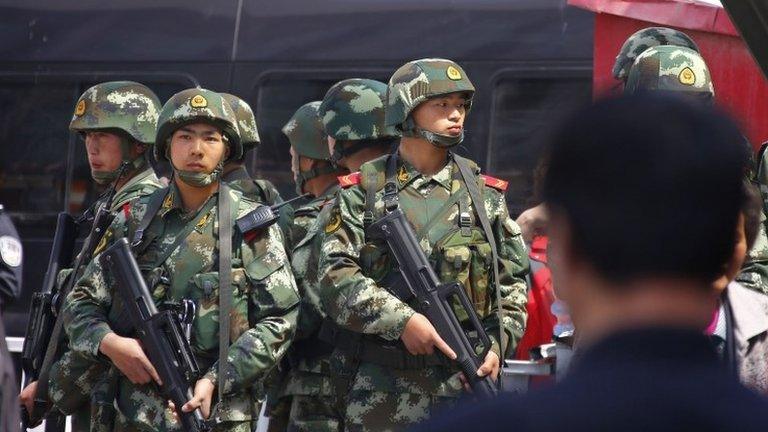China tries to block Xinjiang blast memorial
- Published
The BBC's John Sudworth filmed the memorial on a mobile phone before being ordered to leave the scene
For a few hours, while we were still allowed to broadcast from Urumqi's North Park Street (Gongyuan Bei Jie), we had seen people arriving carrying bunches of yellow flowers.
Just a day after Thursday's attack, which left 39 people dead and 94 injured, the street had already been scrubbed clean of signs of it.
Security, as you would expect after an incident of such dreadful magnitude, was tight. Ranks of riot police patrolled up and down. Plainclothes policemen kept a watchful eye and uniformed officers manned the checkpoints.
And they were not at all keen on the flowers. One woman, who had been turned away from her attempt to lay them at the scene, was told they wanted to stop a crowd from gathering. She didn't seem impressed by the concern. "Why won't they let us hold a memorial?" she asked.
Elsewhere along Gongyuan Bei Jie, where people had managed to attach the bunches of flowers to trees, the police were ripping them down and putting them in the bin.
We attempted to interview a flower seller who was giving them away for free. The police had already warned him about what he was doing, telling him not to draw attention to the area. Shortly after the interview, as often happens when covering sensitive stories in China, we were detained.
Put in a van and taken to a police station, our passports and press credentials were examined. We were then told that we needed special permits to film in Urumqi and our video footage was deleted. Then they let us go.

Police told mourners not to linger
Police and candles
Later that day, rumours began to circulate on the internet of an impromptu memorial gathering at 21:00 on Gongyuan Bei Jie. When we arrived, we were met by the same police officer who had taken our details earlier. No filming, she said, and then stayed close to us to make sure.
Along one side of the street, people had placed lighted candles and were writing messages on a banner strung between the trees. "To dear grandparents. You worked so hard your whole life and didn't have a moment to enjoy your retirement. We wish all the best for you in heaven," one of them read.
Reports suggest that there were attempts to stop some people lighting candles but, by the time we arrived, the memorial was being allowed to take place, albeit in a strained and highly tense atmosphere.
Lines of riot police stood along the pavement, shouting at people not to linger. They could take photos, but not of any of the security personnel. "After you've taken the picture, just leave," they were being repeatedly told.
We managed to take a bit of video on our mobile phones. It doesn't show much, but it gives at least a sense of the extraordinary scene. A few minutes later, we were ordered to go.
The attack on Urumqi is, of course, a deeply important story. The situation in Xinjiang is complex and nuanced and needs careful analysis and reporting. The Chinese authorities have long worked hard to make that job extremely difficult.
- Published24 May 2014
